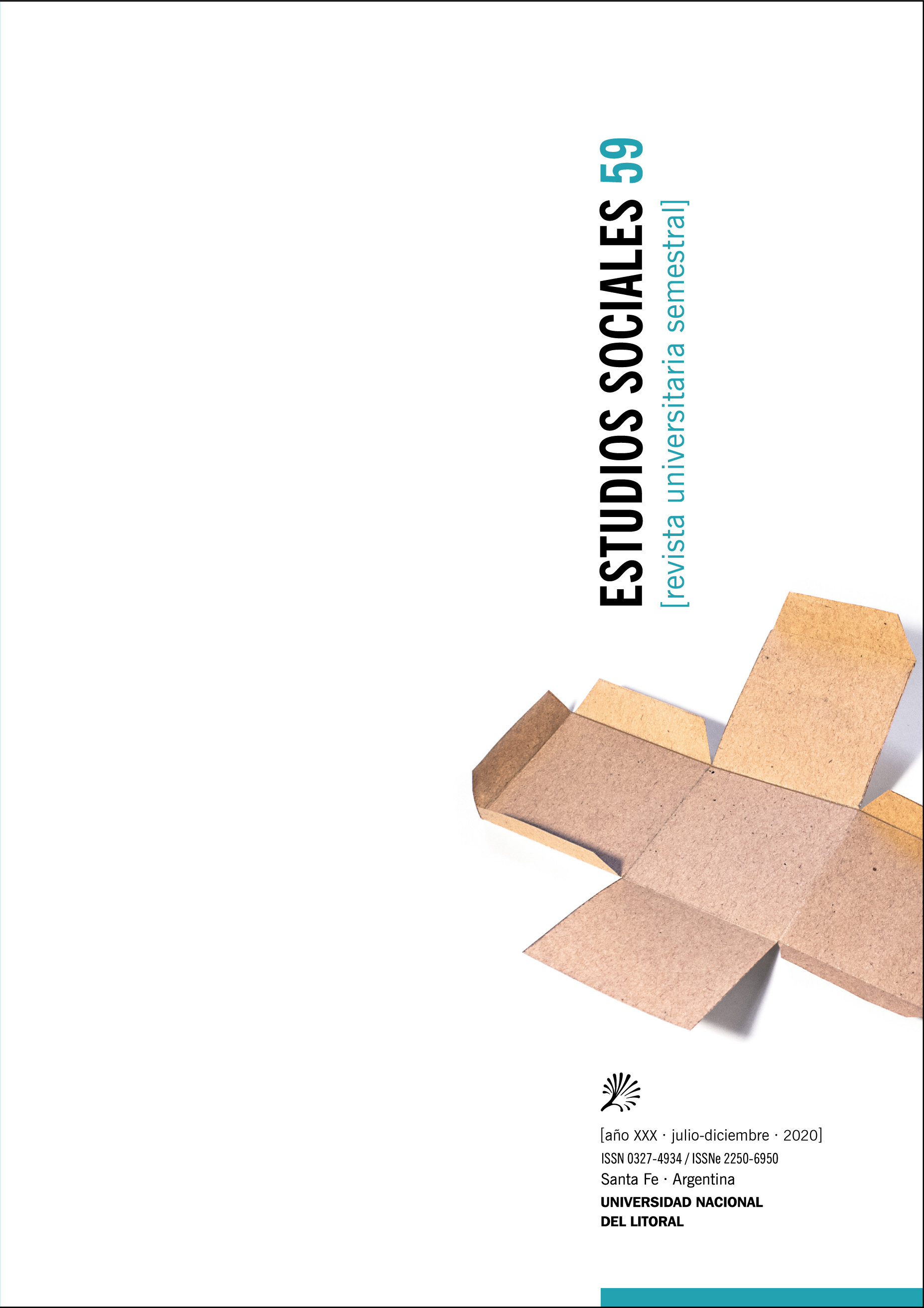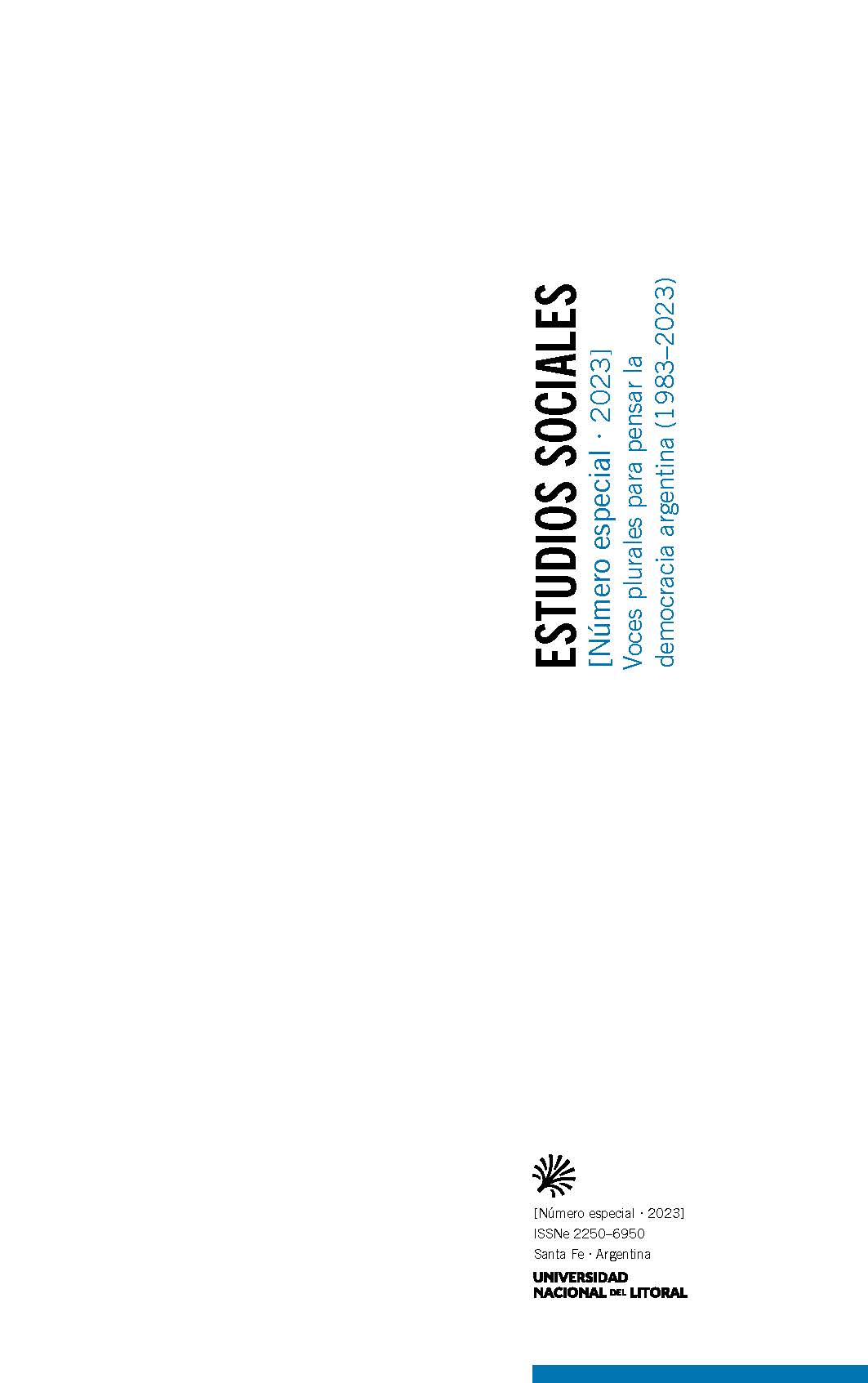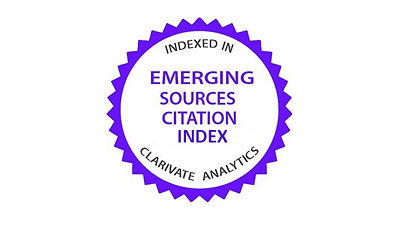Clase y género entre el espacio público y privado. Un análisis de la revista Para Ti en tiempos de crisis
DOI:
https://doi.org/10.14409/es.v59i2.8238Abstract
This article presents a feminist analysis of the relationship between mass media and identities in times of structural change. Its goal is to fill the existing gap in the literature about the socioeconomic and political crisis of 2001-2002 in Argentina in relation to middle class media and the media. It conducts a discourse analysis of the magazine Para Ti between 1995 and 2008 and it pays attention to the magazine’s representations of 1) the relation between women, public space and politics, and 2) food consumption. I show how, in spite of some adjustments to the socioeconomic and political changes, women’s representations continued to be rooted in traditional models of femininity and domesticity. Thus, the magazine reinforced ‘class’ as a fundamental category of identity.
References
ABELA, ANDRÉU ([2003] 2008): «Las técnicas de Análisis de Contenido: Una revisión actualizada», en: Fundación Centro de Estudios Andaluces, vol. 10, nº 2, pp. 1-34.
ADAMOVSKY, EZEQUIEL (2010): Historia de la clase media argentina. Apogeo y decadencia de una ilusión, 1919-2003, Buenos Aires, Planeta.
ADAMOVSKY, EZEQUIEL (2012): «Cipriano Reyes and the Paradox of a Non-Diasporic ‹Negro› identity in Argentina», en: Celleri, Daniela, Schwarz, Tobías y Wittger, Bea (comps.), Interdependences of Social Categorisations, Frankfurt, Iberoamericana-Vervuert, pp. 91-114.
AGUIRRE, PATRICIA (2005): Estrategias de consumo: qué comen los argentinos que comen, Buenos Aires, Miño y Dávila.
ARDITTI, RITA (1999): Searching for Life: The Grandmothers of the Plaza de Mayo and the Disappeared Children of Argentina, Berkeley, University of California Press.
BARDIN, LAURENCE (1986): El análisis de contenido, Madrid, Akal.
BONTEMPO, PAULA (2011): «Para Ti: una revista moderna para una mujer moderna, 1922-1935», en: Estudios Sociales, nº 41, pp. 127-156.
BOURDIEU, PIERRE (1979): La distinción. criterios y bases sociales del gusto, Madrid, Taurus.
BROWN, MICHAEL (2003): «Hospice and the Spatial Paradoxes of Terminal Care», en: Environment and Planning A: Economy and Space, nº 35, vol. 5, pp. 833–851.
CARTER, CYNTHIA y STEINER, LINDA (2004): «Introduction to Critical Readings: Media and Gender», en: Carter, Cynthia y Steiner, Lisa (comps.), Critical Readings: Media and Gender, Maidenhead, Open University Press, pp. 1–35.
COSSE, ISABELLA (2011): «Claudia: La Revista de la mujer moderna en la Argentina de los años Sesenta (1957-1973)», en: Mora, nº 17, vol. 1, pp. 1-15.
D’ANTONIO, DÉBORA (2007): «Las Madres de Plaza de Mayo y la maternidad como Potencialidad para el ejercicio de la democracia política», en: Bravo, María Celia, Gil Lozano, Fernanda y Pita, Valeria Silvina (comps.), Historias de luchas, Resistencias y representaciones. Mujeres en la Argentina, siglos XIX y XX, Tucumán, Edunt, pp. 283–303.
DITTMER, JASON (2010): Popular Culture, Geopolitics, and Identity, Lanham, Rowman & Littlefield Publishers.
DOMOSH, MONA (2004): «Selling Civilization: Toward a Cultural Analysis of America’s Economic Empire in the Late Nineteenth and Early Twentieth Centuries», en: Transactions of the Institute of British Geographers, nº 29, (4), pp. 453-467.
DOMOSH, MONA y SEAGER, JONI (2001): Putting Women in Place: Feminist Geographers Make Sense of the World, Nueva York, Guilford Press.
FARIAS, MÓNICA (2016): «Working across Class Difference in Popular Assemblies in Buenos Aires», en: Darling, Jonathan y Wilson, Helen (comps.), Encountering the City: Urban Encounters from Accra to New York, Londres/Nueva York, Routledge, pp. 169-186.
FARIAS, MÓNICA (2018): «Contesting Exclusion: Solidarity Spaces and Changing Political Subjectivities in Buenos Aires», en: Geoforum, s/n, s/p.
FRIEDAN, BETTY (1963): The Feminine Mystique, Nueva York, W.W. Norton.
GILL, ROSALIND (2007): Gender and the Media, Cambridge, Polity.
GRAMSCI, ANTONIO, HORAE, QUINTIN y NOWELL-SMITH, GEOFFREY (1972): Selections from the Prison Notebooks of Antonio Gramsci, Nueva York, International Publishers.
GRIMSON, ALEJANDRO (2008): «The Making of New Urban Borders: Neoliberalism and Protest in Buenos Aires», en: Antipode, nº 40 (4), pp. 504-512.
GUANO, EMANUELA (2002): «Spectacles of Modernity: Transnational Imagination and Local Hegemonies in Neoliberal Buenos Aires», en: Cultural Anthropology, nº 17 (2), pp. 181-209.
HARAWAY, DONNA (1988): «Situated Knowledges: The Science Question in Feminism and the Privilege of Partial Perspective», en: Feminist Studies, nº 14, (3), 575-599.
INDEC (s/f): Series de la EPH puntual de porcentaje de. Hogares y personas bajo las líneas de pobreza e indigenia en los aglomerados y regiones estdísticas mayo 2001-mayo 2003. Disponible en: https://www.indec.gob.ar/informacion-de-archivo.asp?solapa=2 (último ingreso: 02/03/2020).
JACKSON, PETER y PENROSE, JAN (1993): Constructions of Race, Place, and Nation, Mineápolis, University of Minnesota Press.
KOFMAN, ELEONORE y PEAKE, LINDA (1990): «Into the 1990s: A Gendered Agenda for Political Geography», en: Political Geography Quarterly, nº 9 (4), pp. 313-336.
LAW, LISA (2005): «Home Cooking: Filipino Women and Geographies of the Senses in Hong Kong», en: Howes, David (comp.), Empire of the Senses. The Sensual Culture Reader, Oxford/Nueva York, Berg Publishers, pp. 224-241.
LOPEZ NOGUERO, FERNANDO (2002): «El análisis de contenido como método de investigación», en: XXI Revista de Educación, nº 4, pp. 167-179.
MARGULIS, PAOLA (2007): «El Terreno de la Transgresión. Un recorrido por las publicidades de la revista Para Ti durante la década del 70'», en: Question, nº 1 (14), pp. 1-8.
MARSTON, SALLIE (2004): «A Long Way from Home: Domesticating the Social Production of Scale», en: Sheppard, Eric y McMaster, Robert (comps.), Scale and Geographic Inquiry: Nature, Society, and Method, Malden, Blackwell, pp.170-191.
MARSTON, SALLIE, Y MITCHELL, KATHARYNE (2004): «Citizens and the State: Citizenship Formations in Space and Time», en: Barnett, Clive y Low, Murray (comps.), Spaces of Democracy. Geographical Perspectives on Citizenship, Participation and Representation, Londres, Sage, pp. 93-112.
MINUJIN, ALBERTO y KESSLER, GABRIEL (1995), La nueva pobreza en la Argentina, Buenos Aires, Planeta.
NAGAR, RICHA, LAWSON, VICTORIA, MCDOWELL, LINDA y HANSON, SUSAN (2002): «Locating Globalization: Feminist (Re)Readings of the Subjects and Spaces of Globalization», en: Economic Geography, nº 78 (3), pp. 257-284.
NETTLETON, PAMELA HILL (2011): «Domestic Violence in Men’s and Women’s Magazines: Women Are Guilty of Choosing the Wrong Men, Men Are Not Guilty of Hitting Women», en: Women’s Studies in Communication, nº 34 (2). pp. 139–60.
ROCA, ALEJANDRA (2003): «Cuerpo y medios de comunicación. Viejas obsesiones y nuevas tecnologías: el cuerpo en revistas femeninas argentinas», en: Cuadernos de Antropología Social, nº 17, pp.139-159.
SAYAGO, SEBASTIÁN (2014): «El análisis del discurso como técnica de investigación cualitativa y cuantitativa en las ciencias sociales», en: Cinta Moebio, nº 49, pp. 1-10.
SHARP, JOANNE (1996): «Hegemony, Popular Culture and Geopolitics: The Reader’s Digest and the Construction of Danger», en: Political Geography, nº 15 (6/7), pp. 557-570.
STRIN, MARINA (2012): Everyday Revolutions: Horizontalism and Autonomy in Argentina, Londres/Nueva York, Zed Books.
SVAMPA, MARISTELLA (2001): Los que ganaron: la vida en los countries y barrios privados, Buenos Aires, Biblos.
TONKISS, FRAN (1998): «Analysing Discourse», en: Researching Society and Culture, Londres/ Thousand Oaks, Sabe, pp. 245-260.
VALENTINE, GILL (1999): «Eating in: Home, Consumption and Identity», en: The Sociological Review, nº 47 (3), pp. 491-524.
ZARCO, ABRIL (2011): «Maternalismo, Identidad Colectiva y Participación Política: Las Madres de Plaza de Mayo», en: Revista Punto Género, nº 1, pp. 229-247.
Downloads
Published
How to Cite
Issue
Section
License
Los artículos publicados en Estudios Sociales. Revista Universitaria Semestral se encuentran disponibles gratuitamente en la Biblioteca Virtual de Publicaciones Periódicas de la Universidad Nacional del Litoral: http://bibliotecavirtual.unl.edu.ar/publicaciones.
El contenido está bajo Licencia Creative Commons Atribución-NoComercial-Compartir Igual 4.0 Internacional (BY-NC-SA): no se permite un uso comercial de la obra original ni de las posibles obras derivadas, la distribución de las cuales se debe hacer con una licencia igual a la que regula la obra original.
 Los artículos que sean aceptados, deberán ser acompañados del documento "Autorización para Publicar" que contiene la firma de los autores, en donde se acepta la originalidad del documento y autorizan a la Revista a la publicación del mismo. Las opiniones vertidas por los autores en sus artículos no reflejan necesariamente el parecer de Estudios Sociales. Revista Universitaria Semestral. El contenido de cada trabajo es responsabilidad exclusiva de su autor. En caso de que se utilicen trabajos, datos y/o palabras de otros autores, éstos tienen que ser debidamente citados. Cualquier contenido que sea detectado como fraudulento será elevado al Consejo Editorial de la revista para su revisión, quienes evaluarán el caso y determinarán los pasos a seguir.
Los artículos que sean aceptados, deberán ser acompañados del documento "Autorización para Publicar" que contiene la firma de los autores, en donde se acepta la originalidad del documento y autorizan a la Revista a la publicación del mismo. Las opiniones vertidas por los autores en sus artículos no reflejan necesariamente el parecer de Estudios Sociales. Revista Universitaria Semestral. El contenido de cada trabajo es responsabilidad exclusiva de su autor. En caso de que se utilicen trabajos, datos y/o palabras de otros autores, éstos tienen que ser debidamente citados. Cualquier contenido que sea detectado como fraudulento será elevado al Consejo Editorial de la revista para su revisión, quienes evaluarán el caso y determinarán los pasos a seguir.
Estudios Sociales. Revista Universitaria Semestral adhiere al Código de Conducta y Guía de Buenas Prácticas para editores científicos del Comité de Ética de Publicaciones (COPE):http://publicationethics.org/














